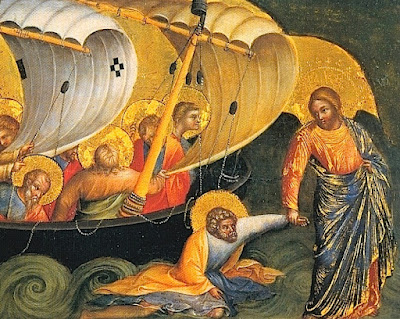I imagine that many of you
did not come here today
expecting to hear Jesus say,
“Do you think that I have come
to establish peace on the earth?
No, I tell you, but rather division.”
With all of the division in the world right now,
did Jesus really come to make it worse?
Didn’t he come, as Zechariah said,
“to guide our feet into the way of peace”?
Didn’t he tell the disciples he sent forth
to let their first words upon entering a house
be “Peace to this house”?
Weren’t his first words to his disciples
after his resurrection “Peace be with you”?
This is the Jesus we are used to,
and whose words captivate us.
did not come here today
expecting to hear Jesus say,
“Do you think that I have come
to establish peace on the earth?
No, I tell you, but rather division.”
With all of the division in the world right now,
did Jesus really come to make it worse?
Didn’t he come, as Zechariah said,
“to guide our feet into the way of peace”?
Didn’t he tell the disciples he sent forth
to let their first words upon entering a house
be “Peace to this house”?
Weren’t his first words to his disciples
after his resurrection “Peace be with you”?
This is the Jesus we are used to,
and whose words captivate us.
Jesus’ words of peace captivate us because
they speak to our deepest desires in a divided world.
St. Augustine said, “peace is so great a good
that even in relation to the affairs of earth
and of our mortal state
no word ever falls more gratefully upon the ear,
nothing is desired with greater longing,
in fact, nothing better can be found” (Civ. Dei 19.11).
Everyone desires peace.
But despite this fact,
we live in a world of conflict and division.
St. Augustine says that this is because
while we all want peace,
we want it on our own terms,
and those terms usually involve
having someone else under our thumb.
Our desire for peace is often only satisfied
when we win and others lose;
division and conflict are not healed but hidden
underneath the cloak of power.
We see this play out on the international stage,
within our own country,
and even within our own families
as we jockey to bend others to our will.
In such a world, those who herald true peace,
a peace built on justice and not on domination,
appear as a source of division and conflict.
And indeed they are,
for by embodying true peace
they unmask the false peace of the world
and make visible the conflict and division
that lie just beneath its surface.
Jesus’ words today stand as reminder
that proclaiming the Gospel of peace in a divided world
might heighten conflict rather than alleviate it,
because it unmasks all those versions of peace
that depend on our side coming out on top.
Jesus is a realist, not an idealist.
He has no expectation that the Gospel of peace
will receive a warm welcome.
He doesn’t think peacemakers are blessed
because everyone likes a peacemaker.
He doesn’t think that the peacemakers are blessed
because they can magic away conflict.
He thinks peacemakers are blessed
because they bear his image,
the image of the one who,
as the Letter to the Hebrews tells us,
endured opposition from sinners—
endured the cross, despising its shame—
for the sake of the joy that lay before him.
They are blessed because they speak
a word of truth in a world of falsehood,
a world in which wars are fought for peace
and peoples divided for the sake of unity.
In recent days we’ve seen a striking example of this
in Bishop Rolando Álvarez of Nicaragua,
a kind of modern-day Jeremiah,
who has not been lowered into a well,but has been placed under house arrest
by the government of his country.
A long-time thorn in the side
of Nicaragua’s authoritarian rulers,
by the government of his country.
A long-time thorn in the side
of Nicaragua’s authoritarian rulers,
bishop Álvarez was charged
with inciting violence
and, in a curious turn of phrase,
“crimes against spirituality.”
I can only presume that in this case
“spirituality” is supposed to refer to
a way of practicing the faith
that comforts troubled consciences
and numbs the pain of oppression—
a faith that never causes offense,
never creates conflict,
never results in division,
never sets the world on fire;
a faith that aids and abets
the false peace of domination.
Bishop Álvarez, like Jeremiah,
and, in a curious turn of phrase,
“crimes against spirituality.”
I can only presume that in this case
“spirituality” is supposed to refer to
a way of practicing the faith
that comforts troubled consciences
and numbs the pain of oppression—
a faith that never causes offense,
never creates conflict,
never results in division,
never sets the world on fire;
a faith that aids and abets
the false peace of domination.
Bishop Álvarez, like Jeremiah,
rejects this sort of spirituality,
and so he is charged
and so he is charged
with being a source of conflict.
But we do not need dramatic examples,
like bishop Álvarez or Jeremiah,
to know how faithfulness to Jesus’s gospel of peace
can uncover conflict, division, and tension.
We can look around our own nation and see
how faithfulness to the social teachings of the Church
on the dignity of all human life,
migration and poverty,
the environment and war
will put you at odds
with the platforms
of both major political parties.
We can look within ourselves
and feel the conflict between
that part of us that is willing to settle
for a spirituality that comforts our conscience
and numbs the pain of life,
and that part of us
that wants to follow Jesus no matter the cost,
knowing that, as the Letter to the Hebrews says,
“In your struggle against sin
you have not yet resisted
to the point of shedding blood.”
We can look around our own nation and see
how faithfulness to the social teachings of the Church
on the dignity of all human life,
migration and poverty,
the environment and war
will put you at odds
with the platforms
of both major political parties.
We can look within ourselves
and feel the conflict between
that part of us that is willing to settle
for a spirituality that comforts our conscience
and numbs the pain of life,
and that part of us
that wants to follow Jesus no matter the cost,
knowing that, as the Letter to the Hebrews says,
“In your struggle against sin
you have not yet resisted
to the point of shedding blood.”
But conflict is not the last word.
Even in the midst of the struggle
that comes with faithfulness to Christ
we can find true peace.
In a recent video message, bishop Álvarez said,
regarding those who have persecuted him,
“Our hearts are full of forgiveness.
That’s why we’re at peace.
Our hearts are full of the mercy of God,
and so we’re at peace….
we are at rest in the hands of the Lord.”
Jesus, who passed through conflict into joy,
is “the leader and perfecter of faith,”
and has come to give us true peace—
not the false peace that hides conflict
beneath the cloak of power,
but the peace that the world cannot give,
the peace that overcomes conflict
through justice and mercy
and self-sacrificing love:
the peace that sets the world on fire.
Let us pray that we would receive that peace,
that we would become that peace,
and that God would have mercy on us all.
Even in the midst of the struggle
that comes with faithfulness to Christ
we can find true peace.
In a recent video message, bishop Álvarez said,
regarding those who have persecuted him,
“Our hearts are full of forgiveness.
That’s why we’re at peace.
Our hearts are full of the mercy of God,
and so we’re at peace….
we are at rest in the hands of the Lord.”
Jesus, who passed through conflict into joy,
is “the leader and perfecter of faith,”
and has come to give us true peace—
not the false peace that hides conflict
beneath the cloak of power,
but the peace that the world cannot give,
the peace that overcomes conflict
through justice and mercy
and self-sacrificing love:
the peace that sets the world on fire.
Let us pray that we would receive that peace,
that we would become that peace,
and that God would have mercy on us all.


